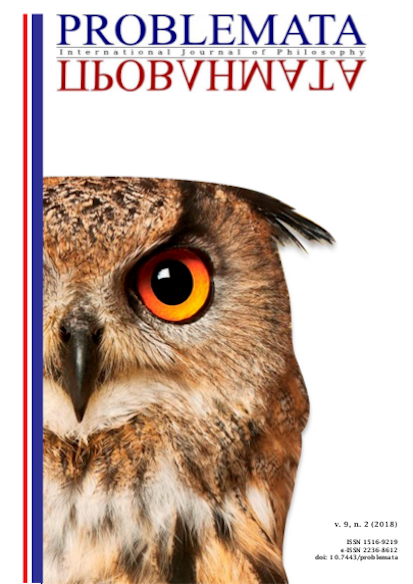PROBLEM OR MYSTERY? THE STATUTE OF PHILOSOPHY VIA GABRIEL MARCEL
DOI:
https://doi.org/10.7443/problemata.v9i2.38078Keywords:
Gabriel Marcel. Philosophy. Mystery. Science. Problem.Abstract
Recurring tone in Gabriel Marcel’s reflections, the distinction between “problem” and “mystery” undoubtedly assumes a singular tenor. What the author points out in this agency is the proper statute of philosophy, especially at a time when there is a remarkable prestige of science as paradigmatic discourse, par excellence. The main specificity of this model is that it faces “problems” and “solutions” in a strictly methodological and therefore, impartially abstract ambit. Although it does not refute the legitimacy of science and its peculiar procedure, the philosophical doing has a diverse nature, adopting, therefore, a more “interrogative” attitude than pragmatically “resolutive”. It is in this direction that epistemic abstractionism impelled by its rhetorical force imposes itself as a misplaced question when it comes to, in concreto, essentially philosophical questions. These, in fact, move in a deeper level of experience, that is, of the “mystery” envisaged as a horizon, by definition, “meta-problematic” from where the most disturbing “enigmas” are excited.
Downloads
References
CALIN, R.; SEBBAH, F-D. Le vocabulaire de Lévinas. Paris: Ellipses, 2005.
CARMONA, F. B. La filosofia de Gabriel Marcel: de la dialéctica a la invocación. Madrid: Encuentro, 1988.
CHENU, J. Le théâtre de Gabriel Marcel et sa signification métaphysique. Paris: Aubier, 1948.
CORTE, M. “Introduction”. In: MARCEL, G. Position et approches concrètes du mystère ontologique. Paris: Vrin, 1949.
DAVIGNON, R. Le mal chez Gabriel Marcel. Montréal/Paris: Bellarmin/Cerf, 1985.
HALL, A. (Dir.). Here comes Mr. Jordan (Que espere o céu). EUA, 1941.
GULLAR, F.; VIOLA, P. “Solução de vida: molejo dialético”. In: VIOLA, Paulinho da. Bebadosamba. São Paulo: BMG, 7432141789-2,1996.
MARCEL, G. L’Iconoclaste. Paris: Stock, 1923.
______. Journal métaphysique. Paris: Gallimard, 1927.
______. Être et avoir. Paris: Aubier/Montaigne, 1935.
______. Position et approches concrètes du mystère ontologique. Paris: Vrin, 1949.
______. Présence et immortalité. Paris: Flammarion, 1959.
______. Pour une sagesse tragique et son au-dela. Paris: Plon, 1968.
______. Les hommes contre l’humain. Préface de Paul Ricœur. Paris: Editions Universitaires, 1991.
______. Le mystère de l’être (I): réflexion et mystére. Paris: Association Présence de Gabriel Marcel, 1997a.
______. Le mystère de l’être (II): foi et réalité. Paris: Association Présence de Gabriel Marcel, 1997b.
______. Essai de philosophie concrète. Paris: Gallimard, 1999.
MERLEAU-PONTY, M. Phénoménologie de la perception. Paris: Gallimard, 1945.
______. Signes. Paris: Gallimard, 1960.
______. Le primat de la perception et ses conséquences philosophiques. Paris: Verdier, 1996a.
______. Sens et non-sens. Paris: Gallimard, 1996b.
______. Causeries (1948). Paris: Seuil, 2002.
NÉDONCELLE, M. “Préface et notes”. In: Œuvres philosophiques de Newman. Paris: Aubier, 1945.
NIETZSCHE, F. Fragmentos póstumos. Trad. Oswaldo Giacóia Jr. Campinas, SP: IFCH/Unicamp, abril/1996, n°22, p. 3-29 [Série Textos Didáticos].
ORTEGA Y GASSET, J. “¿Qué es filosofía?”. In: Obras completas, t. VII, (1948-1958). 2. ed. Madrid: Revista de Occidente, 1964.
______. “El poeta del misterio”. In: Obras completas, t. I, (1902-1916). 7. ed. Madrid: Revista de Occidente, 1966a.
______. “¿Por qué se vuelve a la filosofía?”. In: Obras completas, t. IV, (1929-1933). 6. ed. Madrid: Revista de Occidente, 1966b.
PANZERI, D. Fútbol: la dinámica de lo impensado. Madrid: Capitán Swing, 2011.
PIAGET, J. Sagesse et illusions de la philosophie. 2. ed. Paris: PUF, 1968.
POPPER, K. The logic of scientific discovery. London: Hutchinson, 1959.
______. Objective knowledge. Oxford: Clarendon Press, 1979.
RICŒUR, P. Gabriel Marcel et Karl Jaspers: philosophie du mystère et philosophie du paradoxe. Paris: Temps Présent, 1947.
RUSSELL, B. The problems of philosophy. London: Williams and Norgate, 1912.
SANTOS, D. J. “Entrevista a Jô Soares”, Programa Onze e Meia, São Paulo, 1996. Disponível em: https://www.youtube.com/watch?v=S8eeINyobOw.
SHAKESPEARE, W. The tragedy of Hamlet: prince of Denmark. New Haven and London: Yale University Press, 2003.
SILVA, C. A. F. “Manipular ou habitar? Merleau-Ponty e o paradoxo da ciência”. In: Filosofia Unisinos, v. 14, 2013b, p. 84-99. Disponível em: http://revistas.unisinos.br/index.php/filosofia/article/view/fsu.2013.141.07. doi: 10.4013/fsu. 2013.141.07
______. “Entre o ‘ser’ e o ‘ter’: a ‘hiper’ fenomenologia de Gabriel Marcel”. In: TOURINHO, C. D. C. (Org.). Origens e caminhos da fenomenologia: a tradição fenomenológico-existencial na filosofia contemporânea. Rio de Janeiro: Booklink & Fenomenologia: GT/ANPOF, 2014, p. 160-176.
______. “A militância do concreto: Gabriel Marcel, acerca do engajamento”. In: Ética e filosofia política, (Dossiê Herança Fenomenológica), v. 1, p. 128-149, 2017. Disponível em: http://www.ufjf.br/eticaefilosofia/files/2009/08/20_1_silva_6.pdf.
WITTGENSTEIN, L. Tratactus logico-philosophicus. Trad. Luiz H. L. Santos. 2. ed. São Paulo: Edusp, 1994.
Downloads
Additional Files
Published
Issue
Section
License
Authors who publish with this journal agree to the following terms:
- Authors retain copyright and grant the journal right of first publication with the work simultaneously licensed under a Creative Commons Attribution License that allows others to share the work with an acknowledgement of the work's authorship and initial publication in this journal.
- Authors are able to enter into separate, additional contractual arrangements for the non-exclusive distribution of the journal's published version of the work (e.g., post it to an institutional repository or publish it in a book), with an acknowledgement of its initial publication in this journal.
-
- Authors are permitted and encouraged to post their work online (e.g., in institutional repositories or on their website) prior to and during the submission process, as it can lead to productive exchanges, as well as earlier and greater citation of published work (See The Effect of Open Access).





